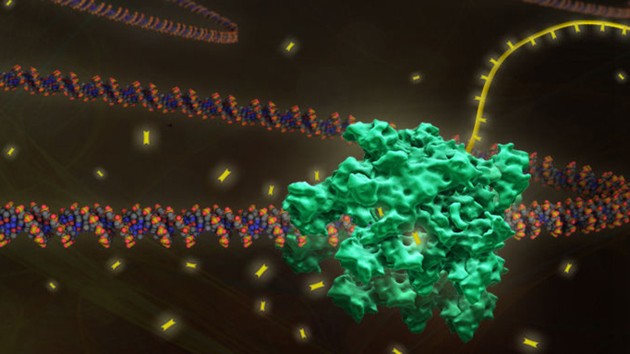Collections
-
-
Collection |
 Infrastructure risk and disaster data
Infrastructure risk and disaster data
This collection brings together a series of works that aim to facilitate the understanding and prevention of disasters involving critical infrastructures. Leading the collection is a series of papers sharing data on the environmental impact of the nuclear accident in Fukushima. The additional papers in the collection provide data related to a broad range of critical infrastructures and enable the assessment and mitigation of possible infrastructure disaster hazards and risks.
Image: yangna, E+ -
Collection |
 Open data in the COVID-19 pandemic
Open data in the COVID-19 pandemic
This collection presents a series of rapidly evolving resources that aggregate and bring cohesion to the massive volume of data being generated in the COVID-19 crisis. The works highlighted include groundbreaking efforts to drive rapid scientific progress through broad collaboration, open data sharing and citizen science.
Image: Gerd Altmann via Pixabay -
Collection |
 Paleoclimate data
Paleoclimate data
To understand our world's changing climate, it is imperative that we understand how climates of the past varied. This collection brings together a series of papers published at Scientific Data that describe and share valuable data on past climates, i.e. 'paleoclimate data'. The data were obtained from a variety of sources, including historical records that can inform us about the recent past, and biological or fossil proxies that allow us to learn about climates that existed long before man walked the Earth.
Image: Photo by USGS -
Collection |
 Occupant behaviour in buildings
Occupant behaviour in buildings
Improving the energy efficiency of the buildings in which we live and work requires not just changes in construction techniques, or the use of more energy efficient technologies. Human behaviour also shapes and influences energy usage in complex and sometimes counter-intuitive ways. The papers in this collection present a series of datasets designed to help researchers explore this important topic. It is hoped that these works will help guide policy development and spark wider data sharing among researchers studying human behaviour in relation to our built environment.
Image: Vladimir Kudinov via Unsplash -
Collection |
 Multi-omics data sharing
Multi-omics data sharing
'Multi-omics' refers to a family of complex experimental designs where researchers apply more than one molecular profiling technology – capturing, for example, the genome, proteome and metabolome – across a common set of biological samples. These experiments offer a wealth of opportunities for subsequent analyses, but the size of the resulting datasets and the diversity of the study designs makes data sharing inherently challenging. In this collection, we present a series of multi-omics studies where the authors have used innovative means to maximize the accessibility and reusability of their datasets.
-
Collection |
 Metadata quality
Metadata quality
Metadata, data about data, are an essential component of any data sharing system. They power discovery and bind together related datasets. They provide essential context, describing, for example, who generated a dataset and how. The papers in this collection explore and critically analyze issues related to the quality and FAIRness of metadata in public resources. Collectively, these works highlight obstacles, both technical and behavioural, that affect metadata quality, and propose possible solutions. They also shine a light on the important, but often underappreciated, role of data curators and research data managers.
Image: xresch via Pixabay -
Collection |
 The ESPA Programme
The ESPA Programme
A collection of data descriptors from studies supported by the Ecosystem Services for Poverty Alleviation (ESPA) programme.
Image: Alex Wunsch -
Collection |
 Open research data resources
Open research data resources
A collection of articles exploring the impact that data resources have on their research communities.
-
Collection |
 The FANTOM5 Project
The FANTOM5 Project
A collection of research and data papers published across Nature Research, from the fifth cycle of the Functional ANnoTation Of the Mammalian genome project (FANTOM).
Image: Richard Janissen - TU Delft -
Collection |
 Replication data
Replication data
The robustness of a scientific finding must be judged not just by the merits of the original experiments, but also by the ability of these findings to be independently reproduced. Concerns that published findings, however, are commonly failing to reproduce have shaken trust in science, and led to calls for reforms in how scientific findings are evaluated and transmitted. As part of this movement, groups have called for replication studies – studies that repeat experiments in previous work to test the reproducibility of previous findings – to be better rewarded and more widely shared. This collection presents datasets collected from a series of replication studies, each presented in a transparent manner that would allow others to analyse the data themselves or compare it with past works. Several of the studies host their data in the Open Science Framework, a service of the Center for Open Science, which has been a strong advocate for wider research replication.
-
Collection |
 Data sharing in functional genomics
Data sharing in functional genomics
Understanding a gene’s functions is no less important than knowing its sequence, but data derived from functional screens have often been shared less systematically and thoroughly than sequencing data. This collection of data descriptors, organized in partnership with groups from leading functional genomics screening facilities around the globe, demonstrates the feasibility and value of sharing these inherently complex data types.
Image: Sam Ogden for Harvard Medical School

 Data from the MOSAiC Arctic Ocean drift experiment
Data from the MOSAiC Arctic Ocean drift experiment